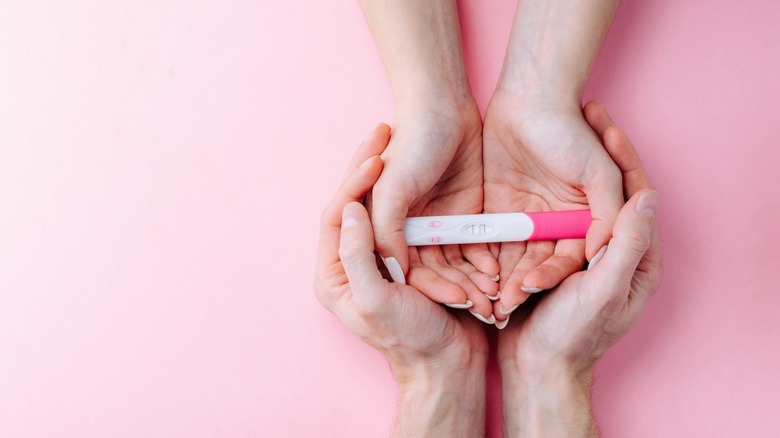Alcohol Or Caffeine: Which Impacts Fertility More?
Fertility is the human miracle of life. It's the natural ability to conceive a child (via American Pregnancy Association). However, many factors can affect the process of conception and pregnancy. For one, healthy eggs and sperm are needed. When the pair comes together, fertilization of the egg by the sperm is critical. During pregnancy, overall health and the hormonal environment of the mother play a determining course for the embryo. Other lifestyle factors may affect the process too. Nevertheless, women can promote fertility by avoiding any sexually transmitted infections and not exposing themselves to anything toxic in the environment, like lead (per Mayo Clinic). A 2018 study published in the Arab Journal of Urology found that things like smoking, psychological stress, drug and alcohol use, and caffeine intake can impact a man's sperm quality.
On the other side of the coin sits infertility. Infertility, or the inability to conceive a child after a year or more of unprotected sex, affects nearly one in five heterosexual women ages 15 to 49 without any prior births, as per the Centers for Disease Control and Prevention (CDC). But nearly one in three infertile couples have issues because of the man (per the National Institute of Health). For men and women, the consumption of certain things, like alcohol and caffeine are often implicated in the success or failure of conception (via Mayo Clinic). Here's everything you need to know about which one impacts fertility more: alcohol or caffeine.
Are six drinks a week enough to negatively impact your fertility?
When faced with infertility, some people turn to fertility treatments for help, says Medical News Today. According to new research, it turns out that the success of fertility treatments may be more greatly impacted by alcohol consumption than caffeine. A 2022 study published in the journal Acta Obstetricia et Gynecologica Scandinavica reviewed the associations between the consumption of alcohol or caffeine and the outcomes of common fertility treatments. They did not find a meaningful connection between caffeine consumption and the success of fertility treatments.
Though not a causal relationship, the researchers in the study did find that consuming as little as 84 grams of alcohol per week was associated with a decrease in female fertility by 7%. In men, consumption of 84 grams of alcohol or more per week was associated with a 9% decrease in the live birth rate. Notably, 84 grams of alcohol is about the same thing as having one standard drink six nights a week (via National Institute on Alcohol Abuse and Alcoholism). You might wonder, how can six drinks a week for men and women potentially affect pregnancy and a successful birth? It seems that consistent use may negatively affect pregnancy because alcohol can indirectly promote oxidative stress (per Medical News Today).


